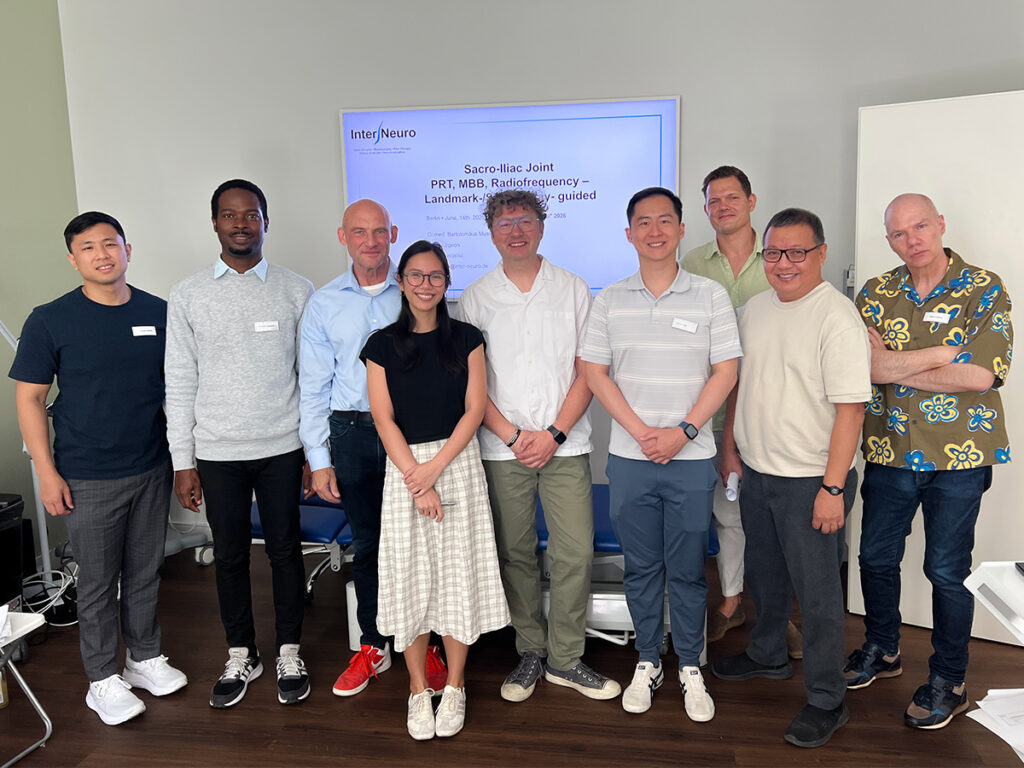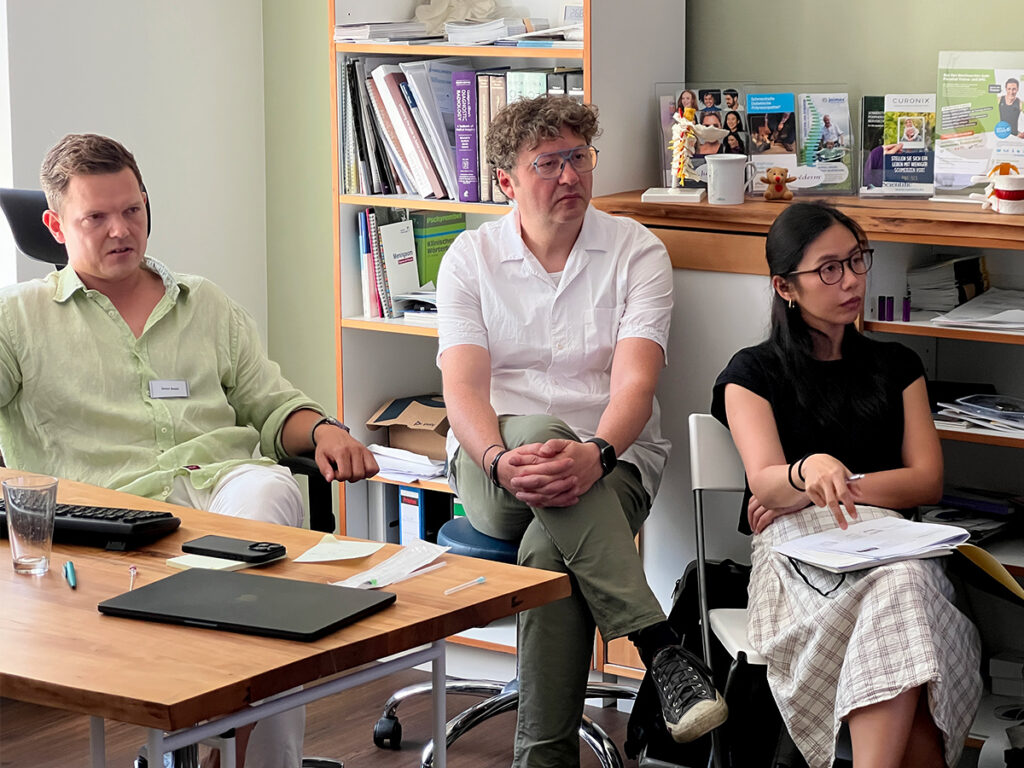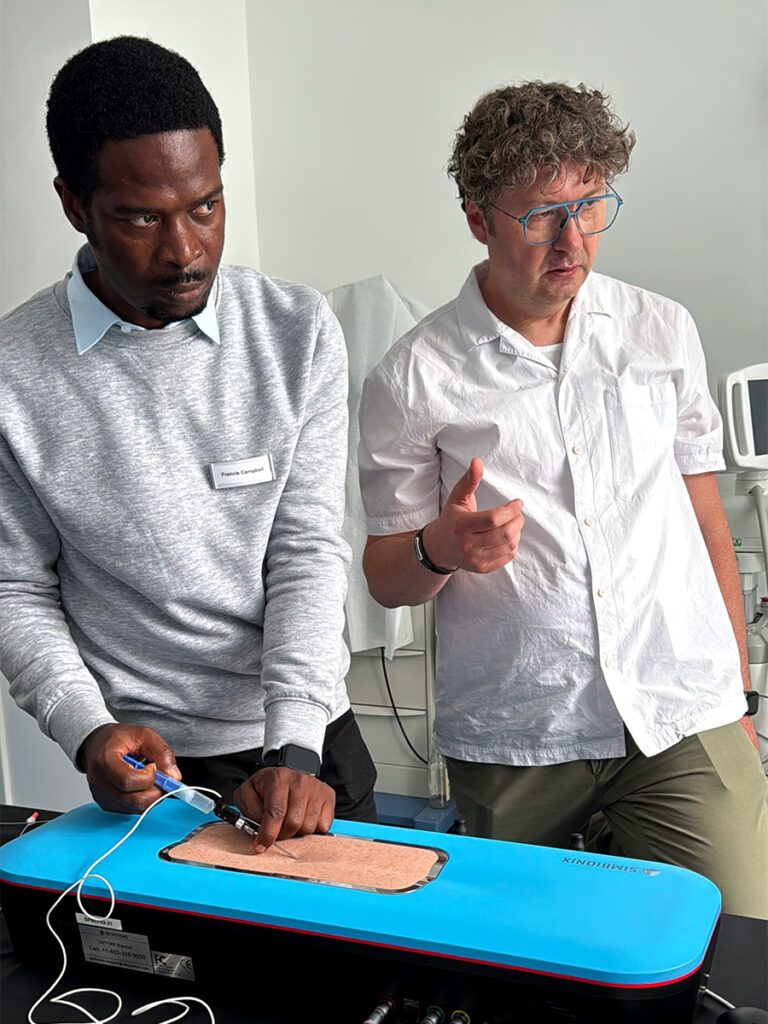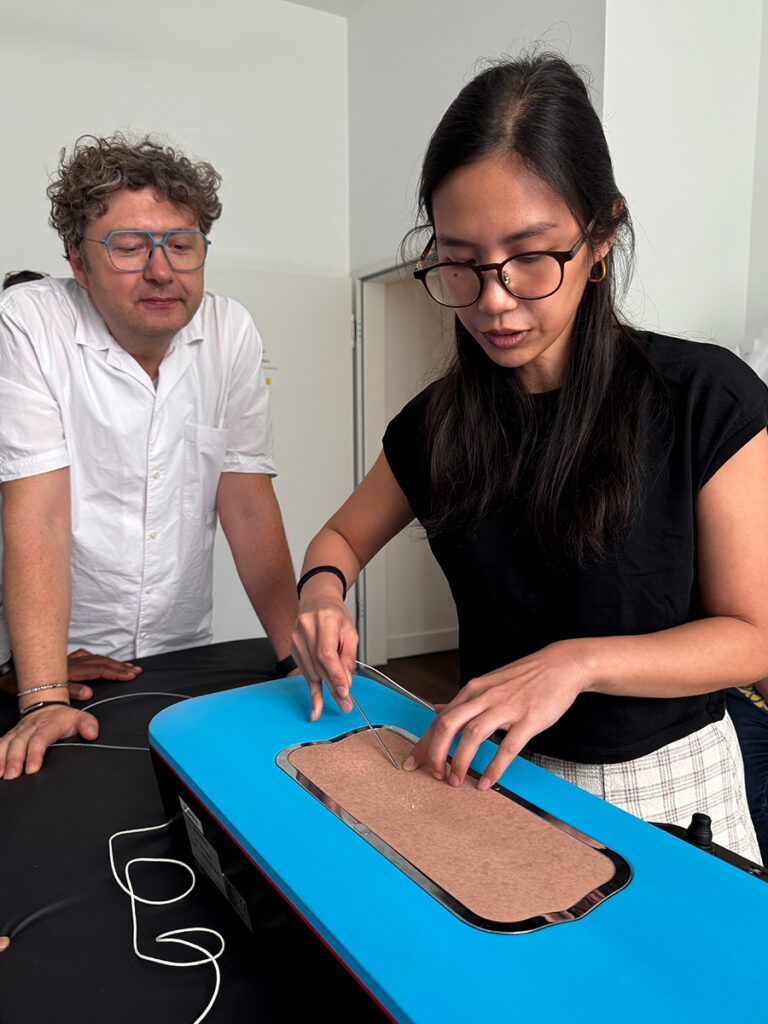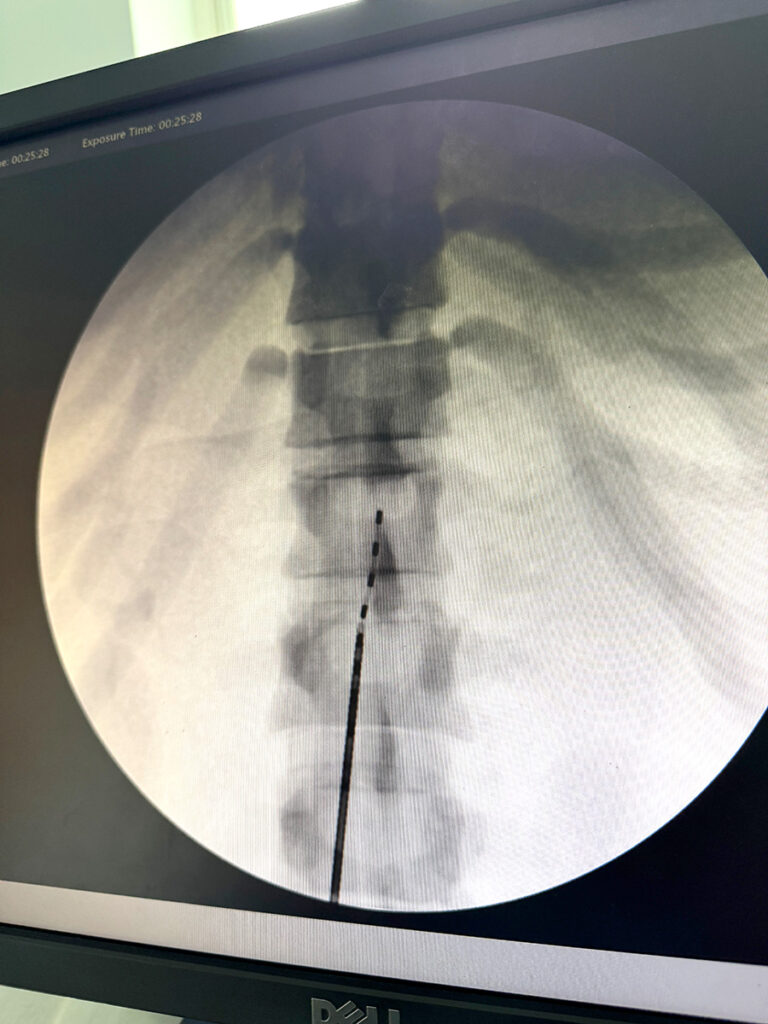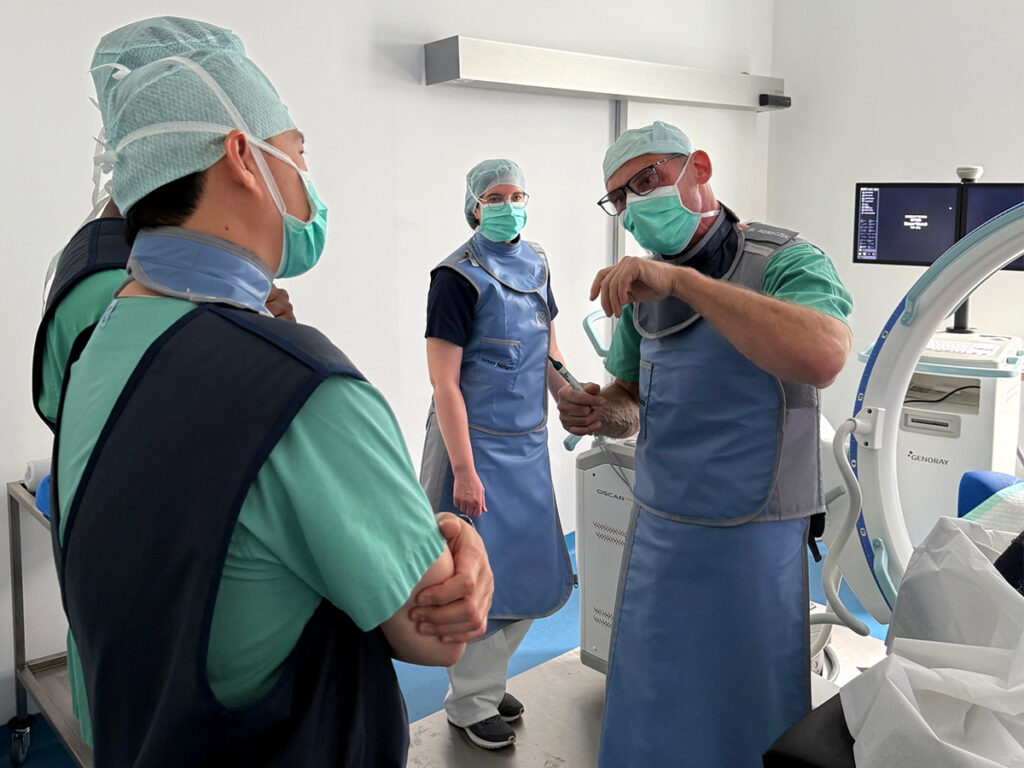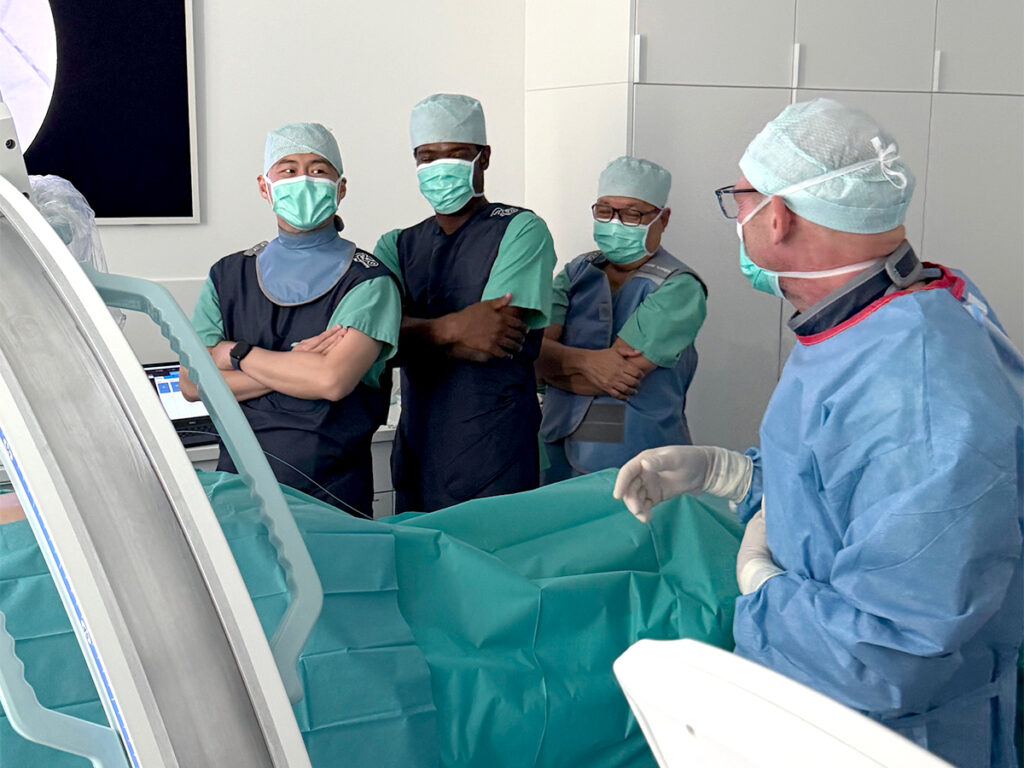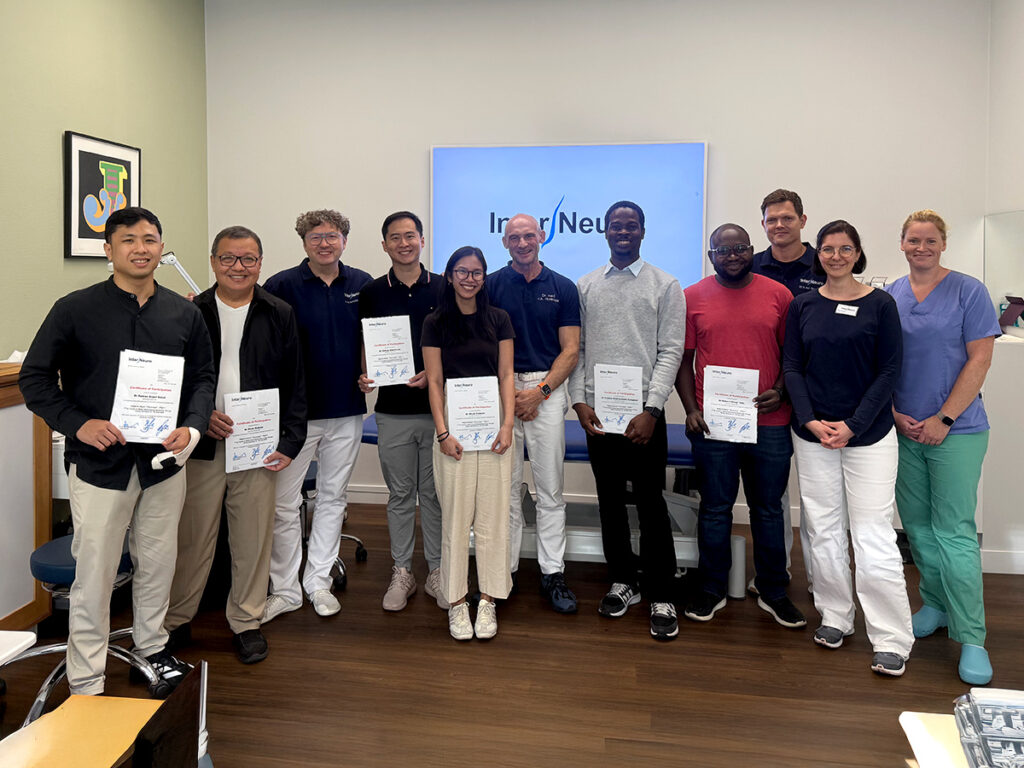International Course in Basic Interventional Spinal Pain Therapy “Help-In-Hand Painless”
1. Project Outline
Patients presenting with pain syndromes caused by spinal pathologies are a growing problem in general and specialised clinics.
Training programmes for interested medical professionals are available in countries with a highly developed medical infrastructure. They are usually organised by professional societies for a substantial fee (often connected to mandatory membership) or by companies promoting and trading products in the field of pain therapy.
This means, that availability of high-quality training is limited to medical professionals working in countries with already highly developed health systems who have the financial means and access to these courses.
Professionals from countries lacking a sophisticated training infrastructure and, unless they are working in the private medical sector, on low payment schemes, therefore are often unable to attend high-quality courses.
As a result, these modern pain treatment modalities are denied to a large proportion of patients being seen by these doctors without sufficient training.
Furthermore, when learning a new technique, the theoretical and practical training is relatively easy to be presented in the course and/or workshop settings.
Translating the acquired knowledge into a working treatment programme in the individual medical professional’s own professional environment is often much more difficult.
There are often organisational, financial, managerial and procedural obstacles that need to be solved.Partnering with a colleague who is already experienced in using the treatment techniques and who knows how to select and assess potential patients, as well as organise and run an efficient interventional pain service, would have a substantial positive impact for the establishment of such a service in the workplace (hospital/clinic) of the newly trained colleague.
Photos: R.J.M. Chevara | büro-d
2. Format and location of the course
The course is divided into four parts:
- Part 1
Location: Berlin, Germany – Inter-Neuro Practice and connected treatment facilities
Duration: 3–4 days
Description: Theoretical training, teaching covering the scientific and anatomical/pathophysiological background of relevant spinal pain syndromes and conditions, examination techniques, and guidelines for selection of eligible patients.
Presentation and observation/experience of real “patient journeys” from examination, diagnosis, treatment to follow-up (treatment pathway) in the clinical setting of the tutors. Due to insurance reasons, patients cannot be treated by the participants who observe and are attached to the tutor (max. 2–4 per tutor) during the clinic, treatment and follow-up of previously treated patients.
Part 1 will be completed with a written multiple-choice as well as a practical examination during patient treatment. - Part 2
Location: Home institution of participant AND online video conference
Time/Duration: several weeks after Part 1 has been completed
Description: During regular clinical work, the participant is selecting eligible patients for interventional pain therapy applying the in Part 1 acquired theoretical knowledge regarding patient selection and preparation.
All potential cases are discussed with his/her mentor in regular video conferences and an individual treatment plan is established and scheduled. Logistic and institutional properties to start the interventional service are discussed and planned. The mentor gives specific advice regarding necessary equipment and facilities as well as patient preparation and staff training. - Part 3
Location: Home institution of participant
Duration: 1–2 days
Description: After enough patients have been scheduled (actual number varies and depends on the individual facility and equipment), the mentor will travel to the participant’s facility and support and advise the participant on the final set-up, patient preparation and actual treatment of all scheduled patients.
- Part 4
Location: Home institution of participant AND online video conference
Time/Duration: 6 weeks after treatment
Description: The participating doctor schedules follow-up visits with all patients and discusses treatment results with the participant.
3. Treatment Techniques
The following treatment modalities will be taught:
1. landmark based injections: lumbar/thoracic facets, sacro-iliac joint
2. landmark-based epidural lumbar injection
3. Ultrasound-based injections: lumbar facets, sacro-iliac joint
4. X-ray-based injections: lumbar, cervical, thoracic facets, sacro-iliac-joint, Ggl. impar
5. X-ray-based RF denervation: lumbar, cervical, thoracic facets, sacro-iliac-joint, Ggl. impar
6. CT-guided lumbar and cervical peri-radicular injection
4. Profile of Participants
The participants should be registered (licensed) medical doctors with proven interest and basic knowledge and some experience in interventional spinal pain therapy.
They need to be able to speak and read English.
They need to have access to an outpatient clinic and a treatment facility with a working CT-scanner and/or adjustable x-ray machine (image intensifier). Access to an ultrasound machine with musculoskeletal ultrasound head is advisable but not crucial.
The participants need to apply by completing an application form and include a short Curriculum Vitae.
As the course addresses the problem of lack of training and treatment access in resource-limited parts of the world, the participants need to prove that they are not exclusively working in the private sector, but at least 30 % in a position serving the public health sector in their normal clinical practice.
As part of the application process, they need to agree to only treat patients free of charge for the purpose of the course and provide at least 30% of their interventional pain service to general (non-private) patients for at least 2 years once the training has been completed.
They are encouraged to share their course-related knowledge with other interested colleagues and, once enough experience has been acquired, act as local tutors.
They agree to polite and respectful collaboration with all participants and mentors.
To facilitate professional networking and collaboration, the participants per course group should preferably originate from a geographically close region. This will also facilitate Part 3, as the mentor can cover several participants in one trip due to close geographical location of the participants.
5. Profile of Course Organisers/Mentors
The course organisers need to provide a track record of several years of experience in interventional spinal pain therapy as neurosurgeon, anaesthetist or pain therapist.
They routinely perform the interventional procedures taught during the course.
They agree to share their knowledge with the participants in a tolerant manner, regardless of gender, age, cultural and ethnic background.
6. Fees
The participation in the training course is free of charge.
7. Travel arrangements
Travel arrangements need to be made by the participant with the assistance of the course organisers.
At the moment, coverage of travel, accommodation and visa fees by the course organisers are not possible.
The mentors will make their own travel/accommodation and visa arrangements with the assistance of the specific participants (i.e. invitation, visa support, accommodation and safety arrangements).
8. Certificate
After successful completion of Part 3, the participant will receive a “Certificate of Completion”, signed by the Course Director and the Mentor.
9. Non-Profit Declaration
The course organisers will not receive any monetary or other benefits for organising and taking part in the course.
10. Grants
The course organisers will apply for government, NGO and industrial grants to cover organisational and/or travel/visa/accommodation costs for participants and mentors.
In case of availability of grants, the funds of the grants will be equally used to support participant’s and mentor’s travel and accommodation arrangements.
11. Miscellaneous
Once the course has been established and participants have acquired sufficient experience, the course concept may be transferred to other treatment centres as course base for Part 1.
The spirit and concept as well as the underlying ethical guidelines need to be observed.
12. How to Contact Us
13. Organisers
Course Director
J.A.Horaczek, MD PhD MBA MSC, Consultant Neurosurgeon, Berlin, Germany
Mentors
J.A.Horaczek, MD PhD MBA MSC, Consultant Neurosurgeon, Berlin, Germany
B.J. Muskala, MD PhD , Consultant Neurosurgeon, Berlin, Germany
Y. Bayambasuren, MD PhD, Consultant Anaesthetist, Ulaan-Baatar, Mongolia
A.M. Hafez, MD PhD, Consultant Neurosurgeon, Cairo, Egypt
Course Secretaries
R.J.M. Chevara, Berlin, Germany
J. Klinger, Berlin, Germany

